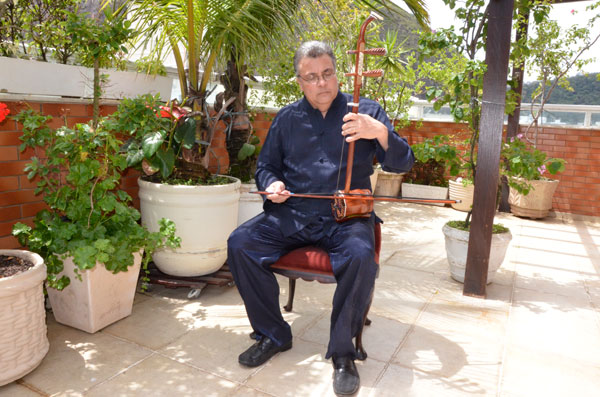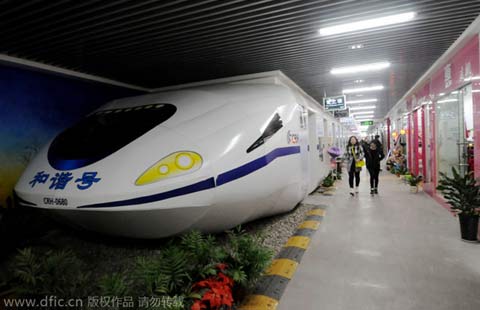Blog bridge Brazil, China economies
Updated: 2015-01-05 05:52
By JI YE in Rio de Janeiro For China Daily(China Daily Latin America)
|
||||||||
 |
|
Ronnie Lins loves playing the Erhus, the traditional Chises musical instrument. Provided to China Daily |
He is a Brazilian economist dedicated to the research of Brazil's financial sector. And he is also an experienced China hand who loves playing Erhu, the Chinese traditional musical instrument.
He is Ronnie Lins, international affairs expert at the Getulio Vargas Foundation College. His Chinese name is Lin Hao, which is similar to the pronunciation of his Brazilian name.
Ronnie recently opened a Chinese blog on one of the most influential Chinese websites, Sina.com, with the help of his Chinese teacher.
The first version of the blog was about trade between Brazil and China, and was aimed at bridging misunderstanding and promoting the economic development between the two BRICS countries.
In the introduction on his Chinese blog, he describes himself as a Brazilian economist who loves Chinese culture. The articles on his blog are all written in easily understandable Chinese words and interact with Chinese Internet users in the Q&A format.
As a result of his love toward China, Ronnie said he hopes the simple and straightforward blog could let Chinese people who read Portuguese or English have a better understanding of Brazil.
Ronnie has visited China at least once in each of the last five years. When talking with Chinese people, Ronnie said he finds that they lack knowledge of Brazil's culture, society and market. That's when he and his Chinese teacher decided to start their blog.
"We hope to tell Chinese people more information about Brazil. We clearly feel that many Chinese people come to Brazil speaking neither Portuguese nor English, they cannot read the related information. Through our Chinese blog and the Q&A format, Chinese people will have a channel to gain Brazilian economic information. Therefore everything must be convenient," said Ronnie.
Over the years, Ronnie has engaged in the research, analysis, consultancy and decision-making aspects of Brazil and China trade.
"Through my studying of the Chinese economy, I summarize some economic topics, which Chinese people are focused on. For instance, the soybean, wheat and corn in agriculture, and the fields in train, aerospace, automotive, energy, oil and infrastructure. Those are followed by most large scale Chinese companies," Ronnie added.
China has been Brazil's largest trade partner since 2009 and Brazil is China's ninth-largest trade partner worldwide and the largest in Latin America.As trade between Brazil and China has prospered in recent years, more Chinese companies are investing in Latin America's largest country, which has great potential as well as challenges.
Ronnie said that China will continue to be a major trade partner of Brazil.
"Brazil's infrastructure is relatively lagging behind, and Brazil urgently needs investment from China. The infrastructure investments will further enhance trade relations between Brazil and China," he said.
Ronnie believes that the economic and trade exchanges between China and Brazil will be more frequent and closer. However, he said the great geographic distance between the two countries and a huge cultural gap still cause misunderstandings, causing some Chinese companies to suffer risks in the Brazilian market.
How to succeed in the Brazilian market, specifically what risks to avoid, is the topic frequently mentioned in Ronnie's Chinese blog.
"Right now numerous Brazilian institutions have done the research about imports and exports, but most of these are focused on statistics. Those are the facts, but people will not know from this information why the facts occur and what are the reasons behind them," Ronnie said.
At the same time, a lot of Brazilian companies will also encounter such problems when they enter the Chinese market," he said.
Ronnie specializes in using "data analysis" approach to explain economic issues.He said he hopes his views and opinions expressed on the blog can become an expert platform for China to understand Brazil, promote the exchanges and cooperation between the two countries, and help businessmen to seek common development.

 Harbin gets ready for ice and snow festival
Harbin gets ready for ice and snow festival
 Shanghai, Nanjing heat up just before predicted cold
Shanghai, Nanjing heat up just before predicted cold
 Police frontier force conducts military exercise
Police frontier force conducts military exercise
 Carpenter creates e-vehicle with wood in Shenyang
Carpenter creates e-vehicle with wood in Shenyang
 Thousands gather in NYC for funeral for slain police officer
Thousands gather in NYC for funeral for slain police officer
 Scars of honour
Scars of honour
 Mall turns shops into rail carriages
Mall turns shops into rail carriages
 Martial arts conference to be held in Georgia
Martial arts conference to be held in Georgia
Most Viewed
Editor's Picks

|

|

|

|

|

|
Today's Top News
What's in store for the stock market in 2015?
Alleged serial killer stands trial in North China
College uses Shanghai stampede to justify its policies
China braces for slower but better growth in 2015
New York mourns slain Chinese-American police officer
Chinese VP attends Brazilian president's 2nd-term inaugural
Brazil uses antidumping measures against China
Thousands gather in NYC to see off slain policeman
US Weekly

|

|







